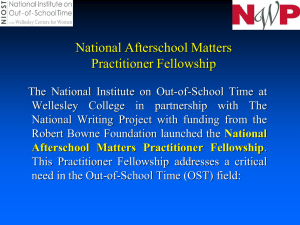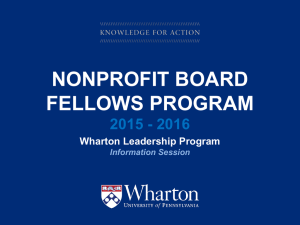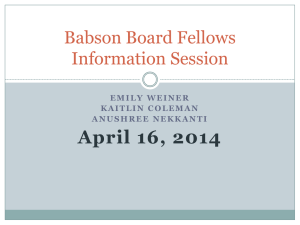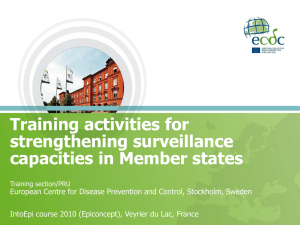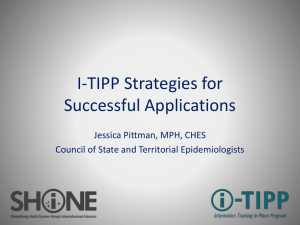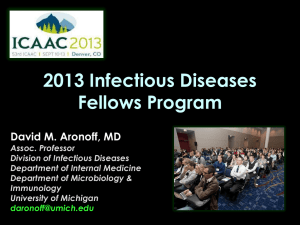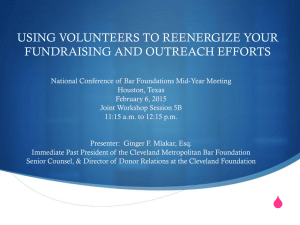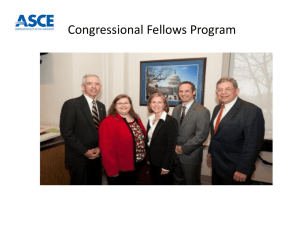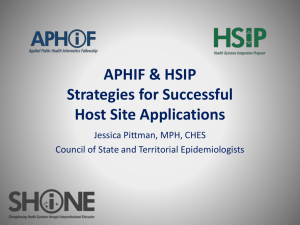Class VIII Mentor Orientation CDC/CSTE Applied Epidemiology
advertisement
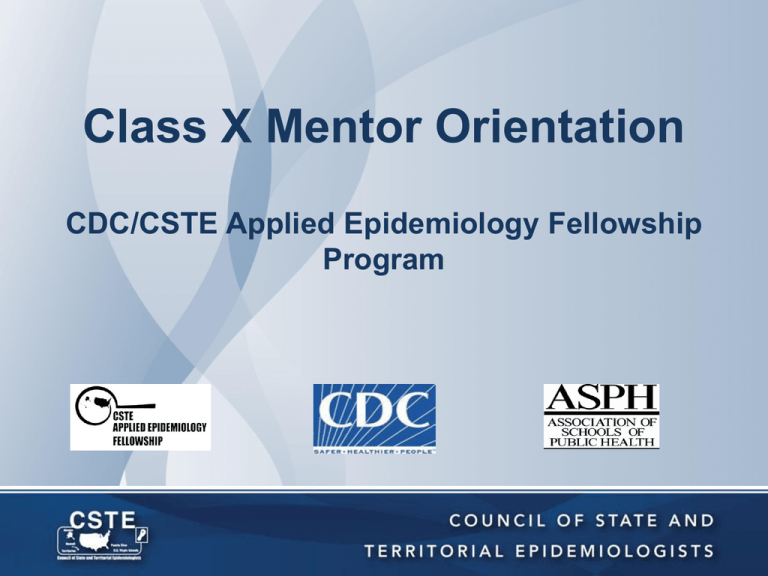
Class X Mentor Orientation CDC/CSTE Applied Epidemiology Fellowship Program Agenda • • • • • • • • Welcome Overview of the Fellowship Role of Mentors Plan of Action Progress Reports Evaluations Professional Development Allowance Employment Goals of the Fellowship Began in 2003 to increase applied epi capacity in state and local health departments 1. Applied epidemiology capacity building program in state/local health departments 2. Provides service to the host site during the 2 years 3. Provides an accelerated training experience and builds epi skills for fellows Overview • Collaboration among CDC, CSTE, & ASPH • Competency based mentorship model for 2 years • Fellows matched by program area – – – – – – – Infectious (including Quarantine, HAI, and Foodborne) Maternal and Child Health Environmental Health Occupational Health Chronic Disease Substance Abuse Injury Fellow Eligibility • An MPH, MSPH, MS, or equivalent degree or an advanced degree in a health-related field • Minimum of 3 advanced graduate-level epidemiology courses and 1 advanced graduate-level biostatistics course • Desire to pursue a long-term career in epidemiology at the state or local level • Demonstrated analytic skills • United States citizenship Status of Fellowship • 199 Fellows have entered the program since its inception in 2003 – Currently 25 second year fellows in Class VIII (graduating Summer 2012) – 28 fellows in Class IX (beginning 2nd year) – 30 new Class X Fellows • 68% of graduates are working at the federal, state, or local level • 10% of graduates pursuing doctoral degree • 9% working in academia, 12% in non-profit/private sector Fellowship Placement • 38 States • 13 large cities/counties • Puerto Rico • 1 Tribal Epidemiology Center Class X Matriculation • 30 Fellows • 8 Infectious Disease • 5 Infectious Disease- HAI • 2 Infectious DiseaseQuarantine • 2 Infectious DiseaseFoodborne • 26 MPH, 4 PhD • • • • • • 4 Environmental Health 3 Chronic Disease 3 Maternal & Child Health 1 Injury 1 Occupational Health 1 Substance Abuse Class X Locations • • • • • • • • • • Arkansas California Clark County, Washington State D.C. Denver Hawaii Iowa Illinois Massachusetts Michigan • • • • • • • • • • Minnesota New Jersey New York City New York State North Carolina Tennessee Utah Vermont West Virginia Wisconsin Mentor Role • Oversee training activities • Ensure familiarity with relevant techniques in the given specialty • Encourage overall professional development • Provide opportunities that will expand epidemiologic knowledge and widen job-related capabilities • Ensure competencies are met • Provide support and guidance to Fellow for their post-fellowship job search Fellowship Handbook • Overview of fellowship activities, requirements, and CSTE’s policies • Mentor information: pages 20-24 – – – – Role Responsibilities Overseeing, Reviewing, and Evaluating Assignments Mentor Checklist Plan of Action • Represents a working outline of the fellows training activities. – Plan of Action described on page 7 – Template available on pages 31-34 • Addresses how the fellow will achieve the competencies required within the fellowship. – competencies listed on pages 5-7 • Must be submitted within the first 90 days of the fellowship Example Fellow Presentations • Use of automated testing in syphilis diagnosis and its impact on surveillance- Connecticut, 2010 • Enhancing statewide drug overdose surveillance by using NC controlled substances reporting system and medical examiner data • Evaluation of Shiga toxin-producing E. coli surveillance in Virginia, 2005-2010 • Racial disparities of self-reported post-partum depressive symptoms among foreign born women in Oregon • Campylobacter outbreak among students consuming raw milk during a field trip Example Publications in MMWR • “Exposure to Nitrogen Dioxide in an Indoor Ice Arena-New Hampshire, 2011” • “Tuberculosis Outbreak Associated with a Homeless Shelter-Kane County, Illinois, 2007-2011” • “Ectopic Pregnancy Mortality-Florida, 2009-2010” • “Emergency Department Visits After Use of a Drug Sold as “Bath Salts”- Michigan, Nov 13, 2010-March 31, 2011” • “Vitamin B12 Deficiency in Resettled Bhutanese Refugees, United States, 2008-2011” • “Rabies Risk Assessment of Exposures to a Bat on a Commercial Airliner- United States, August 2011” • “Occupational Transmission of Neisseria meningitidis-California, 2009” Fellowship Core Competencies Progress Reports • Provide an opportunity to monitor the plan of action and the fellows progress. – Progress reports described on page 8 – Template available on page 35 • CSTE will provide feedback but will not give technical comments. • Fellows are required to complete these reports quarterly. • Schedule of due dates for the quarterly progress reports is listed on page 8. Biannual Evaluations • Accompanies the progress reports to evaluate the fellows performance – Evaluation described on page 8 – Templates available on pages 40-49 • Feedback from this evaluation provides an opportunity to identify where the fellow needs to concentrate their energy and effort to strengthen their skills. • These evaluations are submitted every 6 months Professional Development (Page 12) • CSTE provides up to $970 per year for professional development: – Travel to meetings, conferences, short term training programs or classes to enhance work related projects, etc • Poster expenses, in-state mileage expenses, and other general admin expenses are not approved for professional development funding. • Additional funding should be available to support fellows’ attendance to the CDC-sponsored conference in their subject area. Employment (Page 16-17) • 2 Year program but end date flexibility is possible once competencies are completed if employment opportunities arise. Handled on a case by case basis. • Grievance process: We encourage issues to be resolved internally at the host site, CSTE will intervene if invited. – Page 16 • Leave: The fellow agrees to report to the worksite in accordance to policies established by the host health agency. – Fellows are to be granted the same amount of vacation and/or sick leave that a first year health department employee receives. – Fellows must receive approval from his or her mentor for any absences. – Page 17 Calls and Webinars • CSTE will conduct check in calls with fellows 3-4x a year, and be available via email for questions. • CSTE will conduct periodic check in calls with mentors. • CSTE will host regular webinars/conference calls for Fellows. Fellowship Activities • Fellows are required to attend the fellowship orientation in Atlanta August 27-31, 2012. • Fellows required to submit abstract and attend CSTE Annual Conference. – June 7-11, 2013 – June 2014 • Mentors are required to attend the CSTE Annual Conference at least 1 of the 2 years (2013, 2014) Thank you Questions? Amanda Masters, MPH Workforce & Fellowship Coordinator amasters@cste.org 770-458-3811 Ashlyn Beavor, MPH Workforce & Fellowship Administrator abeavor@cste.org 770-458-3811

